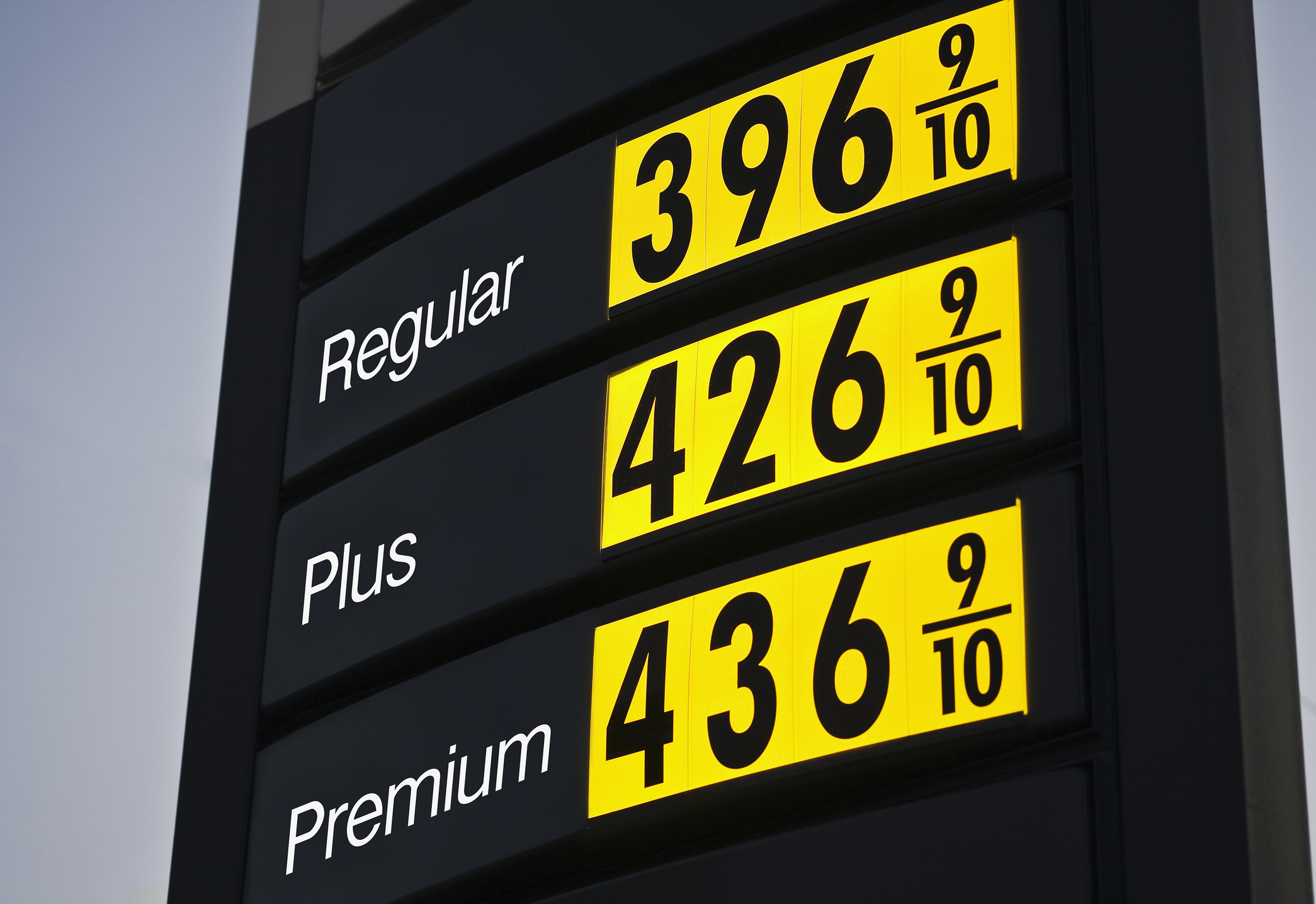Should You Buy a Detroit Car?
Troubles in Motown are mounting, and that could mean a rough road for purchasers of a Detroit vehicle. My advice: Wait for the dust to settle.

Profit and prosper with the best of Kiplinger's advice on investing, taxes, retirement, personal finance and much more. Delivered daily. Enter your email in the box and click Sign Me Up.
You are now subscribed
Your newsletter sign-up was successful
Want to add more newsletters?

Delivered daily
Kiplinger Today
Profit and prosper with the best of Kiplinger's advice on investing, taxes, retirement, personal finance and much more delivered daily. Smart money moves start here.

Sent five days a week
Kiplinger A Step Ahead
Get practical help to make better financial decisions in your everyday life, from spending to savings on top deals.

Delivered daily
Kiplinger Closing Bell
Get today's biggest financial and investing headlines delivered to your inbox every day the U.S. stock market is open.

Sent twice a week
Kiplinger Adviser Intel
Financial pros across the country share best practices and fresh tactics to preserve and grow your wealth.

Delivered weekly
Kiplinger Tax Tips
Trim your federal and state tax bills with practical tax-planning and tax-cutting strategies.

Sent twice a week
Kiplinger Retirement Tips
Your twice-a-week guide to planning and enjoying a financially secure and richly rewarding retirement

Sent bimonthly.
Kiplinger Adviser Angle
Insights for advisers, wealth managers and other financial professionals.

Sent twice a week
Kiplinger Investing Weekly
Your twice-a-week roundup of promising stocks, funds, companies and industries you should consider, ones you should avoid, and why.

Sent weekly for six weeks
Kiplinger Invest for Retirement
Your step-by-step six-part series on how to invest for retirement, from devising a successful strategy to exactly which investments to choose.
When I was growing up, our neighborhood was split neatly into families who were GM loyalists, Ford loyalists and Chrysler loyalists. Look around your neighborhood today and you begin to see why Washington sent the Big Three carmakers' CEOs back to Michigan -- in their corporate jets -- without $25 billion of Federal aid.
Loyalty to the American carmakers is low and getting lower. When it comes to cars, Americans have a long memory. We remember the Cadillac Cimarron (a Chevy Cavalier masquerading as a luxury car), the Ford Taurus (which languished as a rental-lot staple while Detroit focused on trucks) and the Hummer H2 (a symbol of Detroit’s myopia).
We remember the years of quality and reliability problems as well as the inept management decisions. We bristle because Detroit neglected fuel-efficient cars, gave expensive perks to the unions and even paid workers while production lines were idled.
From just $107.88 $24.99 for Kiplinger Personal Finance
Become a smarter, better informed investor. Subscribe from just $107.88 $24.99, plus get up to 4 Special Issues

Sign up for Kiplinger’s Free Newsletters
Profit and prosper with the best of expert advice on investing, taxes, retirement, personal finance and more - straight to your e-mail.
Profit and prosper with the best of expert advice - straight to your e-mail.
Detroit has made great strides fixing its problems and designing better cars, but it may be too late. As Americans have fled to foreign makes, many of which are produced right here in the U.S., Detroit's market share has dwindled to 48%, compared with more than 60% five years ago.
Many people no longer think that the Big Three are too big to fail. According to a recent Gallup poll, more Americans (49%) oppose government assistance to the automakers than support it (47%). That's partly why a skeptical Congress, already skittish after handing more than $700 billion to the Treasury to right the economy and the financial markets, told the Big Three to come back in December with plans detailing how they would use federal money to make changes that would make them "viable."
President-elect Obama has said he supports aid to the automakers in return for the type of plans Congress has requested. But GM could be out of cash by Christmas, making Chapter 11 bankruptcy a strong possibility. Ford borrowed big a couple of years ago, so it has more cash to burn but ultimately faces the same problems. Chrysler’s parent has been shopping the carmaker around, but with no new products in the works and a lineup heavy on trucks and SUVs, no one is rushing to buy.
That leads to a couple of questions: What about customers? What are the risks of buying a vehicle from a carmaker that's on the brink?
Assuming the worst
When CNW Research asked people who intend to buy a new vehicle within six months whether they’d buy from a bankrupt carmaker, about 80% said they would abandon GM and Ford. More than 90% of shoppers with a Chrysler product on their list would go elsewhere.
That's a big reason that GM's CEO, Rick Wagoner, says that a Chapter 11 bankruptcy restructuring simply wouldn't work. Customers would stay away, and the capital markets in this credit climate wouldn't lend money to a carmaker on the ropes. Under this scenario, GM is forced into liquidation. Hundreds of suppliers and dealers also go under.
Another alternative: a "prepackaged" bankruptcy that the automaker, its unions and its creditors negotiate beforehand and present to a judge for approval. This might be less frightening to auto buyers, but it's still a big unknown. And of course, if one auto company goes through reorganization in bankruptcy court and emerges with a far lower cost structure, the other two Detroit companies will be unable to compete and be forced into bankruptcy to get the same agreements, says Aaron Bragman, an analyst with IHS Global Insight. It's hard to view any of these outcomes as positive in terms of attracting nervous shoppers.
Your Risks
Car buyers have reasons beyond wavering loyalty to avoid troubled automakers. Buying a ticket on a bankrupt airline may cause you little pain, but when you buy a car, you enter a long-term relationship. You have a warranty, you need service and parts, and you want a decent price when you trade in the car down the road.
The warranty is one of the biggest stumbling blocks. It's likely that foreign carmakers would buy assets of a failing automaker, and the sale of any car brand would have to include the warranties. Stronger nameplates -- such as Cadillac, Chevrolet and Jeep -- are more likely to survive (along with their warranties) than, say, Saturn or Dodge.
It's also possible that third-party companies would buy warranties without buying the brand or, if a carmaker declared bankruptcy, that the government would establish a warranty insurance fund to pay for repairs.
Parts could be in short supply temporarily as the manufacturers most closely allied to Detroit shake out. Part suppliers sell to both domestic and foreign brands, which could lead to a shortage of parts for their vehicles, too. But other suppliers would pick up the slack. Likewise, dealers would go out of business, but plenty would remain open and prepared to service vehicles -- especially because the service operations are the profit centers of dealerships.
You'll get a generous discount when you buy a discontinued car, but you'll also take a big hit on its resale value. When GM announced it was shutting down the Oldsmobile brand, people still bought them, sometimes at firesale prices. But the cars quickly depreciated. A year after Olds went out of business, two-year-old models had the value of other brands' comparable five-year-old cars, according to Kelley Blue Book.
Bottom Line
I wish the U.S. carmakers and the industrial Midwest all the best. No one wants to see the pain associated with job losses. But although I'd love to play the patriot card and recommend that you support the American carmakers, why take the chance? You have enough problems with your retirement and college funds to risk another hit on your personal finances.
If you need a car now, you're going to get a sweet deal on any number of foreign makes. If you'd rather buy American, at least wait and see what happens before you commit. If the Detroit carmakers can raise enough cash to keep operating until 2010, when concessions on health care and labor contracts kick in, they have a good shot at surviving long term.
Profit and prosper with the best of Kiplinger's advice on investing, taxes, retirement, personal finance and much more. Delivered daily. Enter your email in the box and click Sign Me Up.

Mark was the editor of Kiplinger's Personal Finance magazine from July 2017 to June 2023. Prior to becoming editor, he was the Money and Living sections editor and, before that, the automotive writer. He has also been editor of Kiplinger.com as well as the magazine's managing editor, assistant managing editor and chief copy editor. Mark has also served as president of the Washington Automotive Press Association. In 1990 he was nominated for a National Magazine Award. Mark earned a B.A. from University of Virginia and an M.A. in Writing from Johns Hopkins University. Mark lives in Washington, D.C., with his wife, and they spend as much time as possible in their Glen Arbor, Mich., vacation home.
-
 Dow Adds 1,206 Points to Top 50,000: Stock Market Today
Dow Adds 1,206 Points to Top 50,000: Stock Market TodayThe S&P 500 and Nasdaq also had strong finishes to a volatile week, with beaten-down tech stocks outperforming.
-
 Ask the Tax Editor: Federal Income Tax Deductions
Ask the Tax Editor: Federal Income Tax DeductionsAsk the Editor In this week's Ask the Editor Q&A, Joy Taylor answers questions on federal income tax deductions
-
 States With No-Fault Car Insurance Laws (and How No-Fault Car Insurance Works)
States With No-Fault Car Insurance Laws (and How No-Fault Car Insurance Works)A breakdown of the confusing rules around no-fault car insurance in every state where it exists.
-
 10 Things You Should Know About Buying a Car Today, Even if You've Bought Before
10 Things You Should Know About Buying a Car Today, Even if You've Bought BeforeIf buying a car is on your to-do list, and it's been a while since you went shopping for a new one, this guide will help avoid any nasty shocks in the showroom.
-
 Get the Best Car Deal in Retirement: Here's the Trick
Get the Best Car Deal in Retirement: Here's the TrickPlanning on shopping for a new car this Labor Day weekend? Here’s how to haggle for a better price, even though you're retired.
-
 7 Gas-Saving Tips That Actually Work
7 Gas-Saving Tips That Actually WorkThese are gas-saving tips that will actually work for you and your car this year.
-
 Want to Lease an EV? The Tax Credit 'Loophole' for That Is Going Away Soon
Want to Lease an EV? The Tax Credit 'Loophole' for That Is Going Away SoonTax Credits If you are deciding whether to lease or buy an electric vehicle, here is what you need to know about how the EV lease tax credit works now that it will be eliminated under Trump's new tax law.
-
 Car Buying in a Topsy-Turvy Market
Car Buying in a Topsy-Turvy MarketYou need a new car? Good luck with that! What should you do? We've got some answers.
-
 Watch Out for Flood-Damaged Cars from Hurricane Ian
Watch Out for Flood-Damaged Cars from Hurricane IanBuying & Leasing a Car In the wake of Hurricane Ian, more flood-damaged cars may hit the market. Car prices may rise further because of increased demand as well.
-
 Car Buyers: The 3-Day Grace Period Is Just a Myth!
Car Buyers: The 3-Day Grace Period Is Just a Myth!Buying & Leasing a Car Many car buyers think they have three days after making a purchase to return a car. Here’s where they’re going wrong, and what they should do instead to get a decent used car.
-
 PODCAST: Car-Buying in an Inflated Market with Jenni Newman
PODCAST: Car-Buying in an Inflated Market with Jenni NewmanBuying & Leasing a Car With cars both scarce and expensive these days, what to do if you want – or need – a new ride? Car-buying strategist Jenni Newman of Cars.com shares some tips. Also, more on the magical 9% savings bond.